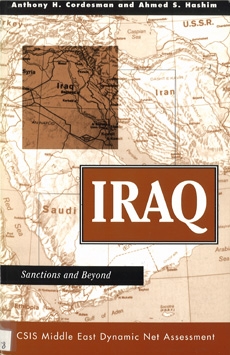Contents
List of Tables and Illustrations / ix
Acknowledgments / xiii
1 Introduction / 1
The Policy Options for Dealing with Iraq, 1
Key Policy Complications in Dealing with Iraq, 3
A Lack of Present and Future Consensus, 5
Policy and the Role of Analysis, 6
2 Internal Political Developments Since the Gulf War / 8
Internal Political Developments Since the Gulf War, 8
The Informal and Formal Basis of Iraq's Power Structure, 10
3 The Informal Politics of the "Center" / 12
Sunni Popular Opinion and the "Center" Immediately After the Gulf War, 12
Sunni Popular Opinion and the "Center" Since the Gulf War, 13
Growing Alienation and the Death of "Reform," 16
Problems with the Key Clans, 19
Problems in Saddam's Family and Coterie, 21
Current Trends in Iraq's Informal Power Structure. 31
Implications for Western and Southern Gulf Strategy, 33
4 The Formal Politics of Iraq's Instruments of State Power / 36
The Revolutionary Command Council, 36
The Ba'ath Party, 37
The Cabinet and Government Leadership, 40
Financial Resources, 42 The Security Structure, 44
The Iraqi Armed Forces, 49
The "Old Boy" Network and the Interaction Between Informal and Formal Instruments of Power, 57
Implications for Western and Southern Gulf Strategy, 58
5 The "Periphery": Opposition Movements and Ethnic and Sectarian Issues / 59
An "Artificial" State, 59
The Politics of Conspiracy and Violence, 60
Opposition Parties, 63
Iraq's Crisis with the Kurds, 70
The Role of the Kurds in a "Centrist" or "Peripheral" Strategy, 95
Iraq's Crisis with Its Shi'ites, 97
Implications for Western and Southern Gulf Strategy, 109
6 The "Periphery": Political Alienation and Abuses of Human Rights / 111
Killings and Torture, 111
Prisons and the Legal System, 118
Freedom of Speech and Political Dissent, 120
Treatment of Minorities and Foreigners, 121
Implications for Western and Southern Gulf Strategy, 122
7 Sanctions and Economic Instability / 124
The Iraqi Economy Before the Gulf War, 127
The Iraqi Economy After the Gulf War, 136
UN Sanctions and the Policies of the Iraqi Government, 137
The Iraqi Government's Refusal of Relief from UN Sanctions, 147
Accepting UN Security Council Resolution 986,150
The Future Political Impact of Sanctions, 153
Debt and Reparations After the Gulf War, 156
Implications for Western and Southern Gulf Strategy, 158
8 Oil and Iraqi Export Capabilities / 161
Iraq's Strategic Oil and Gas Potential, 161
Iraqi Oil Production Before the Gulf War, 163
Oil Production Efforts Since the Gulf War, 170
Iraqi Refining and Petrochemical Capability, 173
Production and Development Prospects Once Sanctions Are Lifted or Relaxed, 174
Natural Gas, 176
Implications for Western and Southern Gulf Strategy, 177
9 External Relations / 182
Iraq's Foreign Policy Since the Gulf War, 182
The Continuing Threat to Kuwait, 184
Relations with Iran, 189
Iraqi Support of the People's Mujahideen, 193
Relations with Syria, Jordan, and Turkey, 193
Iraq, Egypt, and Other Arab States, 200
Iraq and the Gulf States, 201
Iraq and the International Community, 204
Implications for Western and Southern Gulf Strategy, 209
10 Military Developments / 211
Iraqi Military Expenditures, 218
Iraqi Arms Imports, 224
Iraqi Efforts to Smuggle Arms and Parts and Rebuild Its Iraqi Military Industries Since the Gulf War, 226
Implications for Western and Southern Gulf Strategy, 232
11 The Threat from Iraqi Land Forces / 233
The Impact of the Gulf War on die Iraqi Army, 233
The Iraqi Army in 1996, 236
The Republican Guards, 237
Deployments Against the Kurds, 238
Deployments Against the Shi'ites, 239
Land Force Equipment Holdings, 240
Land Force Readiness and Warfighting Effectiveness, 258
Implications for Western and Southern Gulf Strategy, 262
12 The Threat from Iraqi Air and Air Defense Forces / 263
The Cost of the Gulf War to the Iraqi Air Force, 263
Current Air Force Equipment Holdings, 265
Air Readiness and Warfighting Capabilities, 271
Land-Based Air Defenses, 274
Land-Based Air Defense Readiness and Warfighting Capability, 277
Implications for Western and Southern Gulf Strategy, 280
13 The Threat from Iraqi Naval Forces / 281
Surviving Combat Ships, 281
Naval Readiness and Warfighting Capability, 285
Implications for Western and Southern Gulf Strategy, 285
14 Unconventional Warfare and Terrorism / 286
Recent Iraqi Terrorist Activity, 286
Attempting to Assassinate President Bush, 287
Other Recent Iraqi Acts of Terrorism, 288
Implications for Western and Southern Gulf Strategy, 289
15 The Threat from Iraqi Weapons of Mass Destruction / 290
The Struggle to Eliminate Iraq's Weapons of Mass Destruction, 290
Iraq's Future Missile Capabilities, 306
Iraq's Future Chemical Weapons Capabilities, 314
Iraq's Future Biological Weapons Capabilities, 318
Iraq's Future Nuclear Capability, 333
Implications for Western and Southern Gulf Strategy, 335
16 The Problem of Policy: Beyond Sanctions and "Dual Containment" / 344
The Case for Continuing Military Containment, 345
Prospects for Political Change, 350
Iran and Iraq: The Risk of a "Devil's Bargain," 356
The Problem of Sanctions, 357
Sources and Methods / 360
Notes / 363
About the Book and Authors / 394
|
